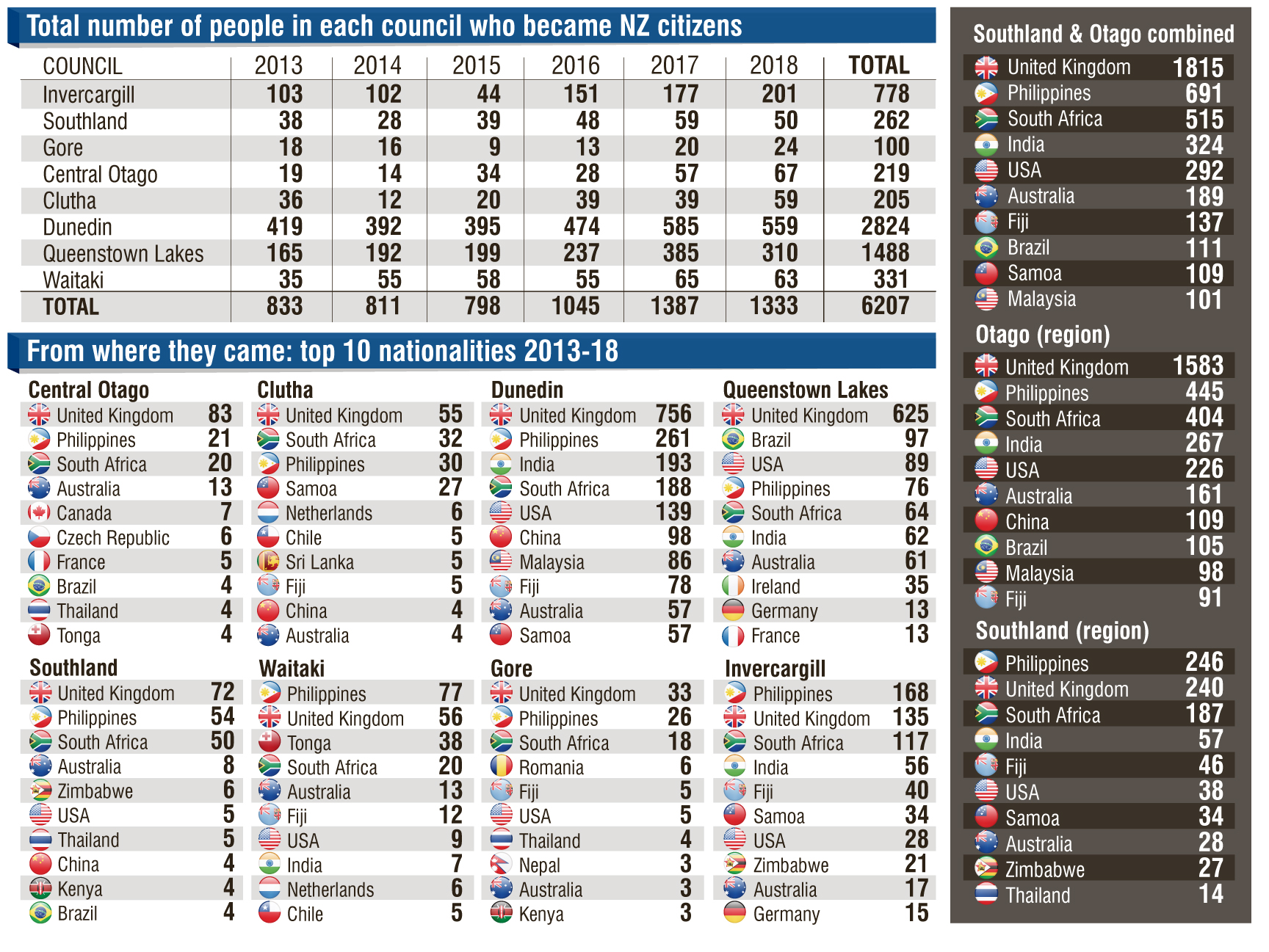
Something is clearly in the water in Southland.
The region is already known for its wide open spaces, beautiful scenery and relaxed lifestyle but it has another claim to fame: it's a place where new citizens of New Zealand are being pumped out in droves.
In fact during the past 12 months the region's three councils - Invercargill, Southland and Gore - have gained a total of 275 new citizens, a 7.4% increase since 2017.
But what is the reason behind such an increase?

''We've got a great province that people want to work and live in, which is great. We Southlanders take it a bit for granted but certainly people from the rest of the world love what Southland has to offer in the outdoors and the freedom that we have.''
At the November council meeting, Invercargill Mayor Tim Shadbolt proudly declared it had been a record year for citizenship ceremonies in the city. And the figures back his claim.
In 2018, a total of 201 people in Invercargill, from 26 different nationalities, became Kiwis.
This was an increase of 24 over 2017, during which 177 people, from 22 nationalities, became citizens.
In fact, the total number of new citizens in Invercargill has risen every year since 2006, when the number of new citizens was only 23, from 10 different nationalities.
This increase can be attributed to the work of the Welcoming Communities initiative set out by Immigration New Zealand, as well as local employers looking for skilled staff, according to an Invercargill City Council representative.
Similar numbers can be seen in the Gore District, which had 24 new citizens in 2018 compared to 20 in 2017.

Despite a slight drop in numbers in 2018 compared with 2017, the Southland District Council has had a steady increase of new citizens during the past 13 years.
Fifty people in the district became citizens in 2018 compared to the 18 who took up citizenship in 2006. New citizens peaked at 59 in 2017.
Mr Adam believed there were varying reasons in a person choosing to become a New Zealander and settle in the Southland region.
''I think becoming a citizen is about an internal and emotional decision to choose to make Southland your home, which is a great outcome for everybody.
''Ultimately it's up to those people and their decisions and if they've enjoyed what they've got and the lifestyle and the house they have, then they'll want to make Southland a permanent home and citizenship is just that final step in doing that.''
KEITH BRINKWORTH became a citizen in November last year at a ceremony in Invercargill. Born in Canada, he grew up in the United Kingdom and said the decision to become a citizen was born out of convenience.
''It took a while, actually. Part of it was pragmatism because my wife and I have three kids over here now and they're all Kiwis. And we're thinking about going back to the UK next year and it's a lot easier [being on one passport] than having two of us on British, and three of us on a Kiwi one.''
He said the decision to live in New Zealand came after he had travelled as a backpacker 15 years ago and fell in love with the place.
The number of people acquiring citizenship on a national level dropped in 2018, according to figures from Internal Affairs.
Nationally in 2018 49,428 people acquired NZ citizenship, of whom 13,691 became citizens by descent. The remaining 35,737 were immigrants acquiring citizenship, a drop of 713 compared with the 36,450 immigrants acquiring citizenship in 2017.
In Otago, there were 10 new citizens in 2018 for Central Otago and 20 new citizens in the same period for Clutha.
New citizen numbers dropped in Dunedin (585 in 2017 and 559 in 2018), Queenstown Lakes (385 in 2017 and 310 in 2018) and Waitaki (65 in 2017 and 63 in 2018).
Internal Affairs acting registrar-general and general manager services and access Clare Toufexiss said from around 2016 there had been an increase in the number of citizens across all of New Zealand, although there had now been a drop-off in applications at a national level.
But although numbers at a national level are dropping, Mr Adam believes the number of new citizens will only increase in Southland.
''The reality is that Southland is going to face some pretty substantial labour shortages and so attracting people from offshore, as well as people who might have migrated to other parts of New Zealand and then choose to come down to Southland for job opportunities, is only going to increase as our region continues to grow.''
But perhaps the answer to why so many people are deciding to officially become New Zealanders all comes down to one simple reason: sporting allegiances.
''I'm starting to watch sport against England and supporting the All Blacks or the Black Caps and that's probably the point where I've thought perhaps I'm Kiwi,'' Mr Brinkworth said.












